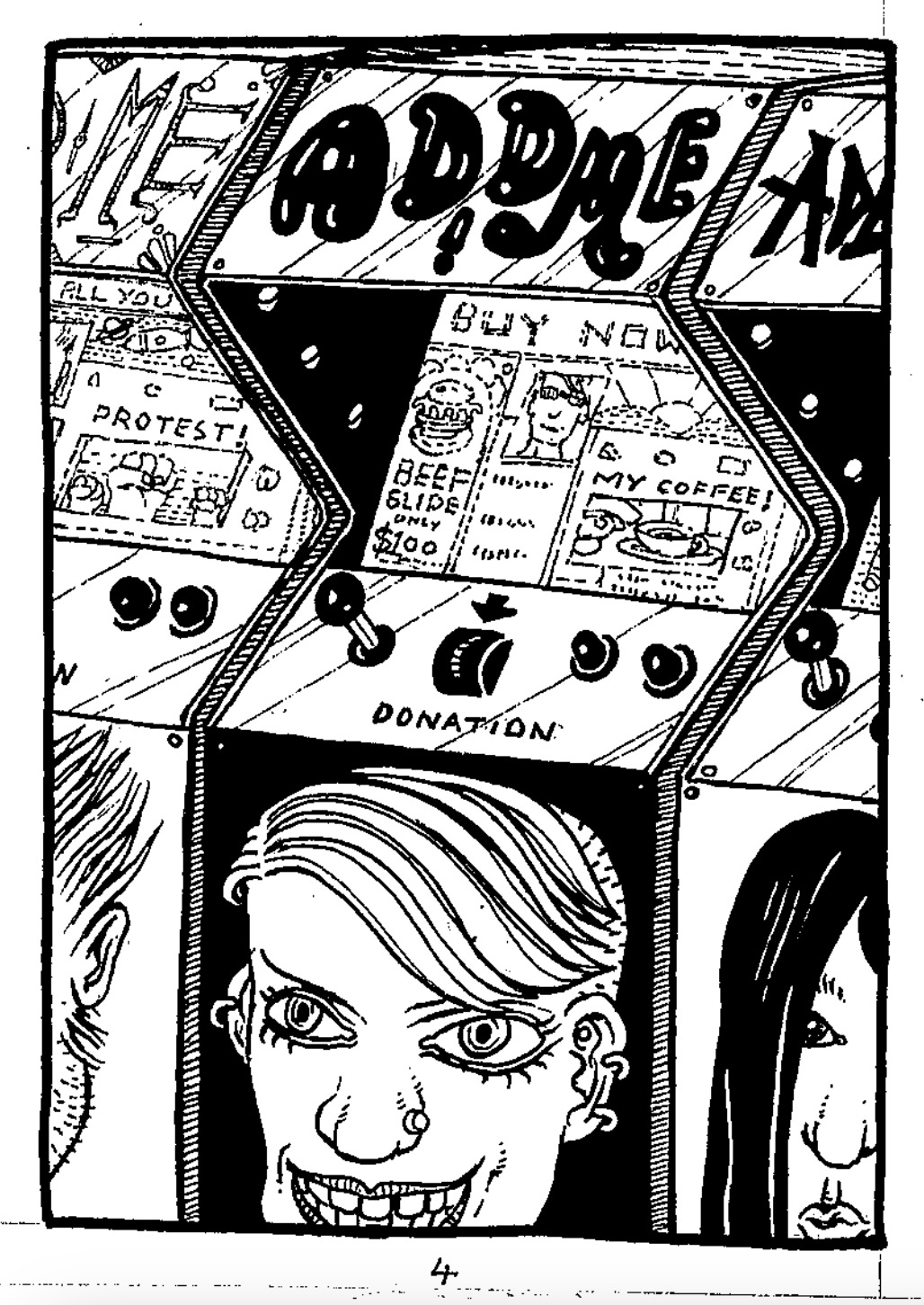ARCADE KID (4)
By:
October 25, 2023
We are pleased to present ARCADE KID, a ’90s “drivethru” written, illustrated, and soundtracked by HILOBROW friend Nikhil Singh. Our readers are urged to check out Nikhil’s dystopian psychedelic-noir novel Club Ded (Luna Press, 2020).

Video-game arcades were labyrinthine. In those days, at least. Connecting disparately. Inventing a multiverse continuum around the world. Kaleidoscopic caves of interactive output. In decades to come, browsing the pages of social media, I was back in the arcades. Only now, instead of games it was people. Character as the maze. Personality dungeons. The video game arcades had physicalized browsing. Often, I would not even play. Just drift from screen to screen. Competition was irrelevant. Absorbing sound and visuals became paramount. Sensoria — just like the song. Recording 8-bit soundtracks on my Dictaphone. Playing them back slowed down. Drenched in a dissonance. Users interacted around me. ‘Adding’ each other. Comparing scores. Even then, these scores were being annotated globally. Fed toward a single source. A growing database of reaction and human ability — to what end? Numerated experience. Louis Aragon is recognised as one of the founding members of Surrealism. Yet, as soon as Breton wrote the manifesto, Aragon jumped ship. He detested labels. The genre-fication of their creative movement was abhorrent to him. In his seminal novel, Paris Peasant, he described his sensory experience of the Parisian arcades. Closed side-alley mazes, decorated with countless images and nationalities, peddling every kind of ware. This ‘modern sensory-overload’ concept of the arcades would later be expanded by Walter Benjamin. A future vision of competitive commercialism, experienced as an Aladdin’s cave. Simulated experiences. Competing side by side, for the attention of browsing patrons. All roads led to the future internet. Analogue virtual — in reverse. That visceral evocation of dreaming consciousness, monetized and rendered practical. User-friendly. No need for a body. Bodiless, online, all cities are the same — immaterial. Abstract image labyrinths. Shorthand text windows. Frozen in time. How similarly data reflects memory. No longer facsimile. Instead — condensed reality. The bitter pill itself. Was a body even necessary to annotate this map of experience? Take the reality of a circuitous route to a destination. Extraneous detail becomes irrelevant online. In the immaterial, only exits and destinations are logged. The details of the journey are forgotten, unless eventful. Reality is pruned. Resisted the internet for years. Reality editing. Radio Free Interzone. Scylla and Charybidis — many headed/gonna suck you in. Walking to cybercafés invents distance. Dipping in and out. ‘Stay a ghost’. Priorities. Dabbled at high school. Saw the risk. Manage addictions before they happen. The weirdness of wireless. That first time. Now, the typewriter has voices in its head. Outside my bubble, online, the storms were building. Everywhere on the electric underground — occult iconography, religious fanatics, chaos magic, alien cults, lunatic conspiracies, sex crimes. The dangerously fertile soil beneath the concrete of suppression. Online. Under the radar. Over the grave. Undermining proscribed forms of social discourse. The writing on the wall. Writing on each other’s walls. Nests of confused anarchy. Maze-libraries of subculture, unfolding lotus forms, limitless root structures. An endless subversion of tropes. Reality remixes. Individual editing. Each person depicted as a living codex. Magazine culture taken to its inevitable extreme. Living, scrollable human tablets. Sequential narratives. Ancient languages.
More NIKHIL SINGH at HILOBROW: DREAMING MEDIA (Q&A) | JOURNEY TO IXTLAN | HASHTAG FASHION POLICE PROBLEMS | ILLUMINATE OR DISSIPATE? | HATE ISLAND. ALSO: HADRON AGE SF (2004–2023) | ORIGINAL FICTION at HILOBROW.
